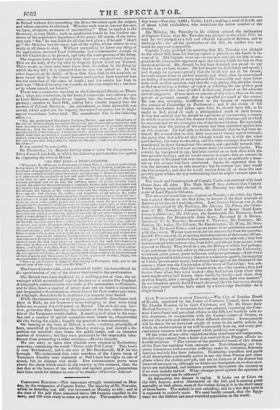CAMBRIDGE ELECTION. —This important struggle terminated on Mon- day, by the
resignation of Captain Yorke. The majority of Mr. Townley, which on Saturday was 428, was increased on Monday to 556 ; and at the close of the poll there remained above 100 freemen unpolled in the town, and 150 were ready to come up next day. The numbers on Mon-
day were—Townley, 2,001 ; Yorke, 1,445; making a total of 3,446, out of about 4,000 freeholders, who constitute the entire number of the county. On Monday, Mr. Townley in his address noticed the declaration of Captain Yorke that Mr. Townley was pledged to the whole Pill: he
said he was pledged to a full and efficient measure of Reform, and to nothing else : for all the particulars of the Bill, he neither was nor could be suppused responsible.
Captain Yorke justified his asserting that Mr. Townley was pledged to the winde Bill, from his having signed a petition to the Lords in fa- vour of it. The Captain went on—lt was now only left for him to con. gatulate his honourable opponent upon the victory which he had on that occasion achieved. He, though he had been defeated, was proud to say that he had not been beaters. He had fought the fight fairly and openly ; and though he regretted greatly that the remit was not in his favour, he could assure them in perfect sincerity and truth, that he entertained no feeling of animosity or envy towards his honourable and more fortu- nate rival on that occasion, and that the only feeliag that filled his breast at that monent was, a feeling of regret at beholding the loss of their good
opinion towards that cause of which Ise lied come folFard as the advocate and the supporter. It was snore on account of that cawc, than on his own.
private or personal account, that he regretted the result of this contest. He was not, certainly, indifferent to the honour of representing the county of Cambridge in Parliament ; and if the choice of his brother freeholders had fallen upon him, be should have felt, as he ought to feel, proud of such a distinguished snack of their favour. It was but natural that he should be ambitious of representing a county in which were to be found his dearest friends and relations, and to which he was attached by the strongest ties of family and fortune. Ile regretted, therefore, that the feeling of the county had been expressed against him
on this occasion. He had only to declare distinctly that he had been de-
feated. He trusted that in this, their moment of victory and of triumph, the party that had achieved that triumph would use it with the same good feeling, the same moderation, and the same courtesy, that had been manifested by them throughout this contest, and especially towards him. For that courtesy he had now to return them his warmest thanks. The contest, he was proud to say, had been carried on on boat sides with the best possible feeling; and lie would venture to assert, that no contest in any county in England had ever been carried on in so creditable a man-
ner as this contest had been conducted. Again, he regretted that he was the defeated man on this occasion ; but he trusted that they would 1.1Se him tenderly, and that he would receive from all of them the best possible good wishes for any undertaking that he might venture upon in this life.
The frank and honest speech of Captain Yorke was received with loud cheers from all sides. The Highs Sheriff then declared that Captain Yorke having resigned the contest, Mr. Townley was duly elected in room of Lord Francis Osborne.
The successful candidate was chaired on Tuesday ; on which (lay there was a grand dinner at the Red Lion, in honour of the final triumph of Reform principles in Cambridgeshire. Lord Francis Osborne was in the chair,—supported by Mr. Townley, Mr. Adeane, Mr. Paton, the Chair. man of Mr. Townley's Committee ; the Earl of Kerry (Lord Lans- downe's eldest son), Mr. Osborne, the Honourable Mr. Ponsonby, Lord
Camperdown, the Honourable John Grey, Reverend G. A. Brown, Reverend W. G. Townley, Reverend C. Townley, Mr. Banbury, Mr. Bowers. Mr. Astley, Mrell ibbert, Mr. Hemm ington, Mr. Wing, M r. Gun- sling, Mr. Professor Prime, and a great many other gentlemen connected with the comity. We can spareroom for but one extract from the speeches. Lord F. Osborne said, in proposing the independence. of the county of Cam- bridge—" They had had more thancommon foes to contend with ; they had had to contend with persons who, from habit, and almost from nature, were opposed to liberty. They lived in a see, the Bishop of which had perhaps, more patronage than any other in the country ; there was the University,
which had great power, great influence, and great patronage; there was a large and powerful aristocracy; there was a numerous gentry, the majority of which, he was sorry to say, had always been against the freedom of the county ; there was the Corporation of the town of Cambridge : but, not- withstanding all these, they had beaten them one after another, they had beaten them when they were united—they had beaten them when they were single—they had beaten them family by family—and there they stood at length, after a struggle of twenty-one years, their own masters." Its a subsequent speech, Lord Francis observed, that he had never, during his twenty years' service, been asked by a Cambridge freeholder for a single favour !


























 Previous page
Previous page